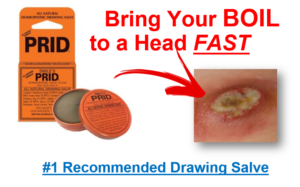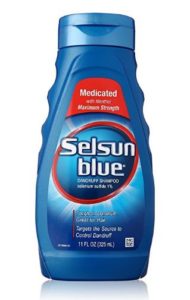Boils On The Scalp
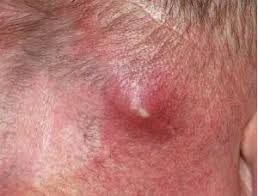 Having boils on the scalp are not only painful, but they can be quite embarrassing since they can cause hair loss, and are more noticeable than other areas of the body since you can’t exactly hide them with a band aid. Fortunately, there are ways you can treat your scalp boils and help prevent future ones from forming.
Having boils on the scalp are not only painful, but they can be quite embarrassing since they can cause hair loss, and are more noticeable than other areas of the body since you can’t exactly hide them with a band aid. Fortunately, there are ways you can treat your scalp boils and help prevent future ones from forming.
Boils on the Scalp Causes
Since hair particles are a vulnerable place for boils to form, the head is a target for boils to form if the right kind of bacteria is present on your skin. Most of the time, bacteria known as staphylococcus enters through a hair follicle, scrape, or micro-cut and infects the skin, causing pus to form underneath the skin.
You can also get them more frequently if you have a weaker immune system, or if you are not washing your head and hair frequently.
Treatment for Boils on the Scalp
Most boils can be treated at home without going to the doctor. Boils will typically form a head, where they will naturally pop and the pus can drain. This is a good thing because it can begin to heal from this point. Follow these steps to help the scalp boil heal quicker than if left untreated.
 Help the boil come to a head by using a warm, moist washcloth, and letting it set on the boil for 15 to 20 minutes at a time, 3 or 4 times a day if possible. The heat from the warm washcloth will increase blood flow in the blood vessels, and the pus will come to a head faster.
Help the boil come to a head by using a warm, moist washcloth, and letting it set on the boil for 15 to 20 minutes at a time, 3 or 4 times a day if possible. The heat from the warm washcloth will increase blood flow in the blood vessels, and the pus will come to a head faster.
The boil will eventually pop and open up so the pus can drain. This is good, because the pressure will be released, and the pus can exit the body. You can encourage the pus to drain by continuing to use the warm washcloth on the boil throughout the day, and gently pressing around the edges of the boil if you can get pus to come out.
NEVER try to pop the boil or squeeze the pus out by force. Doing so can lead to further infection, and cause you even more pain.
Tip: To avoid spreading infection to you or someone else, ALWAYS use a clean washcloth each time and wash your dirty washcloths in hot water with bleach or antibacterial detergent.
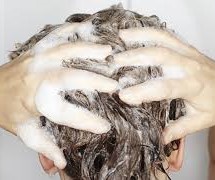 Keep the boil and surrounding area as clean as possible. You want to make sure any bacteria from the boil’s drainage doesn’t spread anywhere else. The best way to do this is by washing your hair with a natural, antibacterial shampoo. You may need to do this 2 or 3 times per day during the initial drainage, as it can leak to other parts of your head.
Keep the boil and surrounding area as clean as possible. You want to make sure any bacteria from the boil’s drainage doesn’t spread anywhere else. The best way to do this is by washing your hair with a natural, antibacterial shampoo. You may need to do this 2 or 3 times per day during the initial drainage, as it can leak to other parts of your head.
Boils on the Scalp Home Remedies
There are several home remedies you can apply to the boil on your head to help it heal faster:
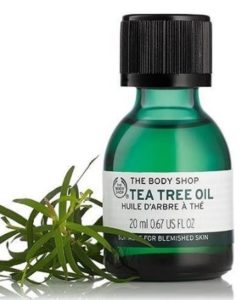 Tea Tree Oil: This oil contains natural antibacterial and antiseptic properties that can help naturally heal an open sore such as a boil. You should dilute the oil with olive oil or coconut oil, as putting it straight onto your scalp could sting a bit.
Tea Tree Oil: This oil contains natural antibacterial and antiseptic properties that can help naturally heal an open sore such as a boil. You should dilute the oil with olive oil or coconut oil, as putting it straight onto your scalp could sting a bit.
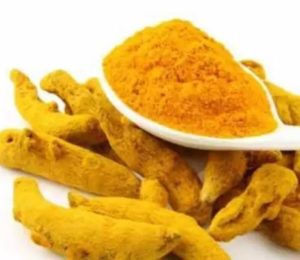 Turmeric: This is a natural ingredient that has been used for thousands of years in Eastern medicine, and still used today because of its effectiveness. You can make a turmeric paste by mixing turmeric powder with water or ginger until you get a pasty consistency. Apply the paste to your scalp boil 2 or 3 times per day. The anti-inflammatory properties in turmeric can help soothe the burning sensation and help speed up the healing time.
Turmeric: This is a natural ingredient that has been used for thousands of years in Eastern medicine, and still used today because of its effectiveness. You can make a turmeric paste by mixing turmeric powder with water or ginger until you get a pasty consistency. Apply the paste to your scalp boil 2 or 3 times per day. The anti-inflammatory properties in turmeric can help soothe the burning sensation and help speed up the healing time.
Castor Oil: Castor oil contains ricinoleic acid which is also a natural anti-inflammatory that can help provide soothing relief and healing properties. It is widely used for healing other skin ailments as well.
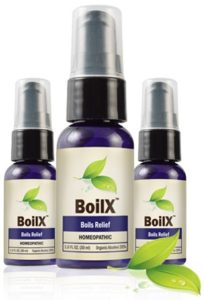 BoilX: This is our top recommended, natural home remedy that many use to treat their boils. It contains a mixture of natural oils and healing agents known to reducing pain and speed up healing time. It works by addressing the root cause of the infection and goes straight into the blood stream to work fast. You can read more about BoilX by clicking here.
BoilX: This is our top recommended, natural home remedy that many use to treat their boils. It contains a mixture of natural oils and healing agents known to reducing pain and speed up healing time. It works by addressing the root cause of the infection and goes straight into the blood stream to work fast. You can read more about BoilX by clicking here.
Boils on the Scalp Hair Loss
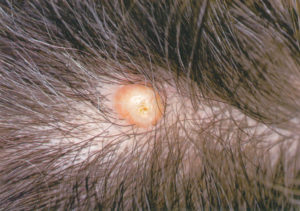 Having boils form on your scalp can unfortunately cause some of your hair to fall out. Inflammation from the infection is known to cause temporary hair loss. It would would rare that your hair wouldn’t grow back after the infection and inflammation completely go away.
Having boils form on your scalp can unfortunately cause some of your hair to fall out. Inflammation from the infection is known to cause temporary hair loss. It would would rare that your hair wouldn’t grow back after the infection and inflammation completely go away.
Scalp Boils Due to Dandruff
Many believe there is a link between dandruff and scalp boils. By treating your hand for dandruff, you will most likely help reduce your chances of getting a boil on your head. See the next section below to see what kind of shampoo is recommended for this problem.
What Shampoo to Use if You Have Boils On The Scalp
There are several options when it comes to good shampoos for treating boils on the scalp. Many dermatologists recommend shampoos that contain coal tar, ketoconazole, selenium sulfide, or zinc pyrithion.
Here are our 2 top recommended shampoos to use for scalp boils:
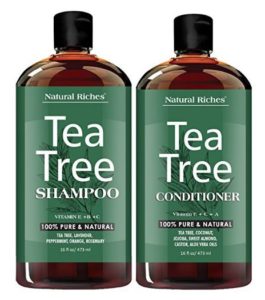 #1: Tea Tree Shampoo by Natural Riches™: Contains natural essential oils with antiseptic and anti-fungal properties to help keep your scalp free from infection-causing bacteria.
#1: Tea Tree Shampoo by Natural Riches™: Contains natural essential oils with antiseptic and anti-fungal properties to help keep your scalp free from infection-causing bacteria.
Price: $23.75
You can click here to order some or check the price.
#2: Selsun Blue (Medicated): This medicated and maximum strength formula helps to control inching, flaking, and serious seborrheic dermatitis of the scalp.
Price: $13.96
You can check the price or order some here from Amazon
Tip: What shampoo you use, it is important that your shampoo is antibacterial. Bacteria is main cause of boils on your head, so by keeping your head as bacteria-free as possible, you can help reduce the chances for getting boils.
Suffer from boils on other parts of your body such as boils on your buttocks or boils under your armpits? You can click the links to see our home remedies for those as well.
